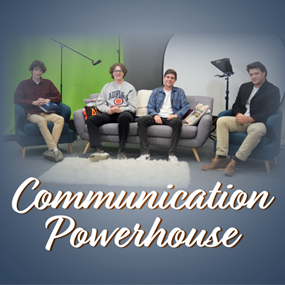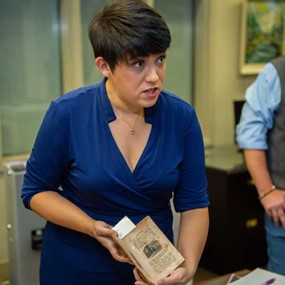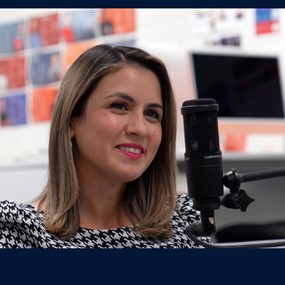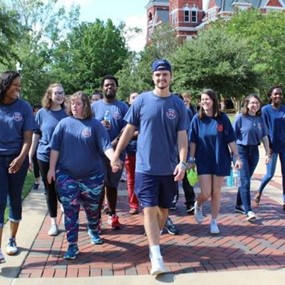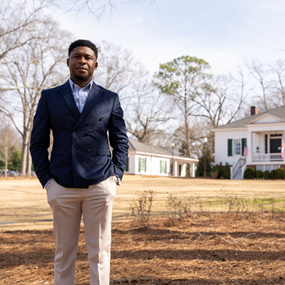Milford discusses things you didn't know about organizations and social change
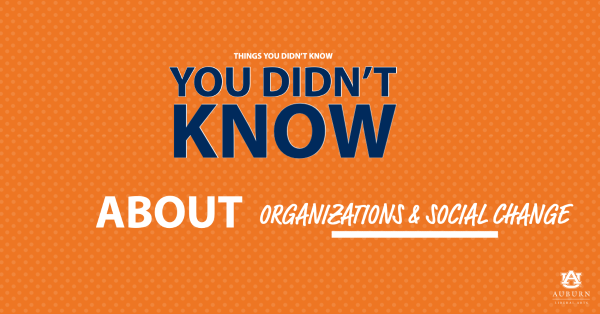
The world is changing, fast. The ways that companies and organizations communicate with their constituents is incredibly important - this has become even more evident in the last year.
A company's understanding of its community is complicated and multidimensional. There’s much to explore in the process of communicating with audiences and the process by which audiences may define limits for organizations.
On this episode of the Things You Didn’t Know You Didn’t Know podcast, Dr. Mike Milford, an expert in pop culture, sports and political messaging, breaks down things you didn't know you didn't know about organizations and social change.
During this chat, he looks at mainstream culture and reminds us that everyone has the capacity to make a difference. He shares advice for companies on winning over an audience, as well as how customers set standards for their businesses.
Transcript
Brandon Etheredge 0:00
In the last year, the calls for corporations to take a stand on social issues have grown louder than ever, from boycotts related to the passage of state laws to increase scrutiny on political contributions by corporations. The way in which organizations communicate in times of social change has become increasingly scrutinized. But what exactly can we learn from how an organization communicates? What does an organization's actions or lack thereof tell consumers? This week, we impact Things You Didn't Know You Didn't Know About organizations and social change. Welcome to episode two of the things you didn't know you didn't know podcast. I'm Brandon Etheredge, and I'm super excited to welcome Dr. Mike Milford to the podcast. He's the Associate Director of the School of Communication and journalism at Auburn University, where he studies Pop Culture, Sports and political messaging. Today, we're chatting about his research into organizations and how they communicate. Thanks for spending some time with us. Absolutely. So Dr. millford, you have spent a lot of time researching groups like the NCAA the Southern Baptist Convention, and others because they give an unusually clear view of how organizations communicate. Why is that?
Mike Milford 1:10
So my research focuses on organizations and communities and the differences in organization may be official, like the democratic party or the Houston Astros, whereas the community may be the fans of the Houston Astros, or people that may vote republican but aren't a member of the party. But what we find is that they communicate in very similar ways. And so what my research does is looks at a collection of comments across different types of media, different types of statements, to get a sense of the larger voice of those organizations and communities. I like to think about it like the difference between a choir and a soloist. I study the choir, a lot of different people talking, but they make one particular melody. And what happens is the more organizations talk, whether that be official representatives, like PR agents, or CEOs, or unofficial groups talk like fan messaging boards, or any other particular group, certain trends begin developing in their communication that clue us into the larger ethos of the organization, what they think is important, who they think is important decisions they make, and generally the logic that sort of underlies this community, because one of the things we talk about in our research is that communities are both horizontal and vertical. And what we mean by that is communities have specific boundaries. There's things we do here at Auburn, that they don't do at the University of Texas, they don't say War Eagle. They say hokum horns. And that's one of the simple things that defines a community. But communities are also organized vertically, meaning within that community, there's certain people that we listen to more than others, that may be an official person like coach, Bruce pearl. But it might also be that person in the fan group that seems to have a better sense of what's going on, or someone we defer to perhaps in our churches, that is another lay person, but for some reason, we imbue them with a sense of authority. And so I pick out those different voices and look for those trends. And what we find is in these organizations, there is a lot going on about how they view people in the organization and outside the organization and how they want to be seen. And that's the key.
Mike Milford 3:31
And I think what's really interesting is some of your research gives some good context to what we've seen over the last year with everything that's happened in 2020. You know, so many organizations were quick to make statements in the wake of the killing of George Floyd and so many other tragedies that we saw. But now we're a year later, their feet are being held to the fire and in ways that a lot of companies, I don't think we're really prepared for what they're their constituents, we're going to expect on the backside of this. So you describe before we were talking on the podcast, you described this concept of motion versus action. And it kind of explains, I think, what we've seen play out over the last year, so kind of help that make sense for us. Sure. So
Mike Milford
4:12
motion and action is a concept we borrow from a philosopher named Kenneth Burke. And it's kind of a complex idea that plays out very simply in everyday life. So when we think about why we do things, and again, we're not talking about the actual events, we're talking about the language we use to describe what happened. We typically describe it in one of two ways. We describe it as a result of something that we had no control over, or as a result of someone's choice. If it's something we had no control over, we call that motion. And I like to talk about it like the rhetorical or the discursive or the the description of an act like a reflex, I had no choice, right versus action which is the product of a very deliberate conscious choice. Now the easiest example is also the worst example we see this language a lot in sexual assault woman is sexually assaulted the questions she gets asked are what were you wearing? How much were you drinking? Why were you out that late? language like that clues the researcher into the fact that they believe it was her choices that caused the assault, not the choice of the assailant. And so that puts the assailant into the realm we would say of motion, meaning they were simply acting as if they would act almost, you know, like an animal. You know, a slightly like light hearted example might be pretending to throw a ball for your dog, the dog reacts as if you threw it, whether you did or not. Whereas for the victim of the assault, she is ascribed action, it was her choice that precipitated the event. Now we know legally, that's nonsense. It doesn't matter what someone's wearing, what someone's drink, how late it is, where someone is, at any hour of the day, you are not allowed to sexually assault anyone. But what we're concerned with is the communal conversation of the assigning of responsibilities to these particular things. So when we take that research into the area of organizations and communities, particularly in the wake of some of the crises we've had over the past, feels like 20 years, but it's only been 18 months. We see a lot of organizations, and a lot of groups talking about things in action in motion terms, who has responsibility. Unfortunately, some of the really bad actors and some police departments are saying, We have no choice we had to open fire. Well, that's not exactly true. You absolutely have choice, but it's the way they're framing that choice. Or we have other bad actors. On the other end, we had no choice we had to burn down this particular building. Well, no, you had a choice, you're choosing to frame the choice in a particular way. And so when we think about what organizations and things like that are doing, that's the key for our type of research, and I think it's really valuable resource for anyone to to look at the communities they're a part of, or look at the communities that they ascribe to, or, or are members of, to ask themselves who has responsibility when they talk.
Brandon Etheredge 7:25
So I think this research gives us some some really interesting context into the broader narrative of what we've seen play out recently. And what I think is really important on the backside of this conversation, and kind of understanding these principles, is the actionable insights that people can take away from your research. So you phrased the takeaways as kind of twofold. There's an action for them, and an action for us. So let's start with them. What should organizations take away from this discussion
Unknown Speaker 7:52
we're having? So I would preface both of these with a warning. Resist what I call the church nudge. And I call it the church nudge because you hear the pastor say something in church that's particularly good and you nudge your neighbor and say, Did you hear that? No, resist the church nudge. This is advice for you and your organizations. You're a part of the political parties, you're a part of the fan groups you're a part of, you know, my daughter's a part of a Swim Club. This involves her Swim Club, bunch of kids swimming around. The The best advice is this. Pay attention to who you say you are, and make sure it's who you want to be. Because those things don't always match. I like to tell my students, one of the first skills they need to learn is to listen to the haters. Man, I know that goes against everything we've we've ever been taught, you know, Taylor Swift wrote a whole song about ignoring the haters. But make sure they're wrong. When people say your organization is hypocritical, that's a clue that what you may be saying and what you may be presenting in terms of your ethos versus the actions you're taking may not line up. So we need to attend to our messaging and be reflexive, we need to take action and not motion. We need to follow through the as you mentioned, there's been a lot of organizations that have made very broad promises over the past year in terms of supporting social justice, supporting political statements, and now we're seeing them continue in former patterns. If that's an organization that you support, you need to call them on that. Which gets us to the second part, which we'll talk about in a second, which is recommendations for for us but as organizations don't let the lag between what you say you're about and the things you do get too wide or you can't recover. Let me give you a good example. Baseball. I do a lot of research in sports. My father in law is a die hard baseball fan always has been played minor league baseball has season tickets. The Texas Rangers loves Baseball. He's an old guy. And he wouldn't mind me saying that. He's an old guy. When I go to games with him, I am shocked at how old everyone is. Baseball has lost a generation of fans because it has clung to a particular operating procedure that has reduced the individuality of players. Think about the bat flip. For example, if you follow sports, you may have seen some controversy about younger players flipping their bat after a great home run and pitchers getting grumpy about it. And they say, well, the unwritten rules of baseball say you can't do that. People like personal expression. And it's not a betrayal of your own organization's values and principles to adapt to new audiences, you have to do it. And so in baseball, the median age which is the average age of a baseball fan now is almost 56 years old. We are two generations away from there being no baseball fans left on earth, except for maybe a dinosaur or something like that. So an organization like Major League Baseball, or Atlanta or my beloved, but very much struggling Houston Astros that I grew up cheering for, they need to adapt to these new audiences don't have to betray what they've always been about. But adapting is critical, making sure that they are true to themselves, but still reaching new audiences. Very important.
Unknown Speaker 11:28
Awesome. I love that. And there's takeaways for individuals as well, for me for you For you know, Sally walking down the street, there's something for everyone to take away from this. So what are the things we as individuals should be looking at, as we talked about this communication with communities and organizations?
Unknown Speaker 11:43
Sure. So individuals as part of an organization, you still have power, you get to decide one of the things we've seen a lot this year is vote with your wallet. If you don't like the way an organization is going, tell them make sure that the organization you joined because they have a set of values is continually displayed. And if they begin acting in a way that's inconsistent with those, call them out, and then you're free to leave. We're sort of drilled in, especially with political parties. And religious organizations, this notion that you ride or die right here at Auburn, we were the Auburn family. And once you're a member, you're a member forever. But if Auburn begins to do things that I think are detrimental to our community, I have the option of saying, No, I don't want to be a part of that anymore. In organizations, they need you to survive, whether it's Major League Baseball, or whether it's my daughter's Swim Club. And if they begin to see that what they're doing is costing them participants, they will either adjust, or you're always free to start something new. Let me give you an example. I don't know how much our listeners know about the Super League that was announced this past week. So in in English and European soccer, there was the attempt to create a Super League, which was going to involve 12 teams, six from the English Premier League, and six from continental Europe from different leagues, and this was going to be sort of a hyper ultimate league. And it was announced on Sunday by Wednesday, all but two teams had dropped out. This was a multi billion dollar activity. These are the biggest clubs in the world. I know here in Auburn, we think nobody loves anything as much as Auburn fans love Auburn football. But we are a drop in the bucket compared to the international footprint of English soccer. What happened and so I became very interested in what happened. What happened was the British football system is set up and what we would call a pyramid, which means there are levels of competition and you may at any point try to move up. So imagine if Auburn, God forbid, lost the SEC next slash next year, we're dead last 2021. If this was the British soccer model, what that would mean is the bottom three teams would go down to Division Two, and the top three teams from Division Two will go up. And that's true from your local club all the way up to the big ones Manchester United, Chelsea, Tottenham. Well, this club said these these 12 clubs said we're gonna make our own special league that we can't be relegated from. But we'll get all the money and it'll, it'll be great. We'll give some money back to the leagues, but it'll give fans more football to watch more soccer to watch whether it's going to be great. The fans lost their minds at Chelsea in which is a suburb of London. The team was on the bus coming back from a game they couldn't even get into the stadium because 1000s of fans showed up protesting this. And I was fascinated because it's exactly thing we're going to talk or we've been talking about the fan said no. British football is about securing your position and defending it. And if you can't you risk relegation, that is what our clubs have been about 450 years. And if you don't want to conform to that, you're out. They called for the owners of those six clubs to be removed their own fans, could you imagine? Could you imagine the owner, you know, of the Atlanta Falcons, the fans were upset. And so they said, You're out. Home Depot guy whose name escapes me right now. Right? What a fascinating depiction of people saying, no, this organization is not going to betray the communal ideals and principles we have. There's a lot of pressure on the owner of Liverpool, there are three owners who are Americans, and they are under a lot of heat, because apparently they were in charge of this, this whole enterprise and they said, your principles of make money at all costs. unfettered capitalism, they don't play here in the community shut down a multi billion dollar international Soccer League fans did. What a remarkable picture of voting with your wallet. So when we think about what can we do sometimes not what can I do against Major League Baseball? or What can I do in my daughter's Swim Club? or What can I do with my political party? Whatever it is, it makes a difference. Absolutely makes a difference.
Brandon Etheredge 16:32
Very, very interesting and so relevant with what's happening right now, across the pond. I really appreciate you having this discussion with us. I think there's so much that people can take away from this and use and think about and really kind of analyze right what these organizations are saying how they're saying it and who's saying it's, I really appreciate it. Thank you so much. Absolutely where you go, thanks for having regal. Things You Didn't Know You didn't know is a production of the College of Liberal Arts at Auburn University. To learn more about our faculty's life changing research, visit cla.auburn.edu
Tags: Faculty Research Community, Outreach and Engagement Communication and Journalism

